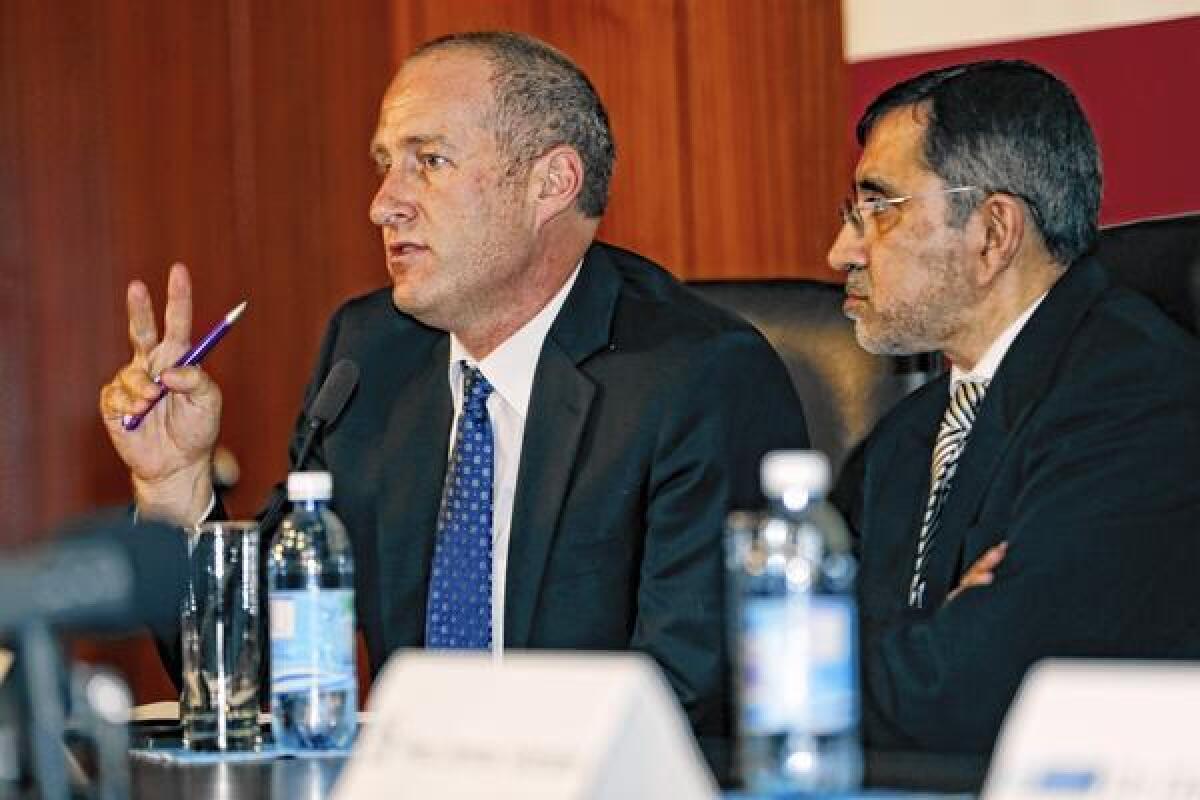Penis transplant offers hope to victims of botched circumcisions

“Their lives have been devastated. They’re all young men,” says Dr. Andre van der Merwe, left, head of urology at Stellenbosch University in South Africa, with professor Rafique Moosa.
In the deep of winter high in the mountains of South Africa’s Eastern Cape, teenage boys clad only in blankets, with white clay painted on their faces, undergo agonizing traditional circumcisions. Hundreds have died as a result of the ritual, and hundreds more have lost their penises when infection set in, according to the South African Health Ministry.
For years, Dr. Andre van der Merwe, head of urology at Stellenbosch University in the Western Cape, has listened to the heartbreaking stories of dozens of victims, many of whom were suicidal. In 2010, he decided to determine how to perform a penile transplant.
“I thought it would be simple. How wrong I was.”
It took Van der Merwe and a team of surgeons nine hours to conduct what is being called the world’s first successful penile transplant, in December at Tygerberg Hospital in Cape Town. It was a tense day, involving hours struggling to tease out delicate nerve endings and blood vessels from the patient’s hardened scar tissue and graft on a penis taken from the cadaver of an organ donor.
“We were not standing around that operating table for nine hours telling jokes,” he said in an interview. “The amount of scar tissue that had been created around the area was huge. It was very difficult to get the nerves out. We couldn’t get the blood vessels out. We had to abandon that effort in the end.” Doctors eventually used another nearby blood vessel.
The result exceeded Van der Merwe’s wildest hopes: He had advised his 21-year-old patient that he might recover his sexual function after perhaps two years. To his astonishment, the man, who has a girlfriend, became sexually active within five weeks.
“We’re sitting on numbers of young men who are without penises and their lives have been devastated. They’re all young men. Some have been living without their penis for 10 years.
“The thing that happens is they commit suicide. They buy food and poison and just go into the bush and have that last meal.”
The issue is limited to the 5-million-strong Xhosa ethnic group on the Eastern Cape, which performs a risky form of traditional circumcision — or ukwaluka — on teenage boys, who are otherwise shunned and ridiculed.
The boys, some as young as 12, wear only blankets in the freezing night, and live in huts high in the mountains for three to four weeks. The rules governing the deeply secretive ritual forbid them to cry, show discomfort, run away or go to a hospital afterward. Those who do are branded as weak failures and “boys” for the rest of their lives.
In the mountains, they are taught by elders how to behave in the community, building huts from sticks and grass for shelter. They’re forbidden to discuss the ritual with outsiders.
Van der Merwe said the most dangerous part of the ethnic ritual occurs after the foreskin is removed with a blade or knife. The penis is then tightly wrapped with strips of goatskin for a week or more, a painful and harmful procedure, particularly because initiates are also not allowed to drink water and are permitted only tiny amounts of dry food.
“If they wrap it too tight, the blood supply will be cut off. They also dehydrate the guys.... You’ve got a dehydrated patient with a necrotic penis and septicemia. Those kidneys go and you have got a death. If they don’t die, it [the penis] falls off anyway.”
Adding to the problem is that some practitioners who conduct the circumcisions have virtually no experience other than having undergone the procedure themselves.
By the time victims seek medical help, their penises are beyond saving, say Van der Merwe and other doctors. The priority is to save their lives.
“I’ll never forget some of those young guys’ faces. The guy asks, ‘When will it grow back?’ You have got to tell them it’s never going to grow back. They just go completely blank. It’s just like they can’t believe it.
“They blame themselves, because the community thinks they’re too weak.”
There are now nine men on a waiting list for transplants, and later in the year, the hospital will analyze whether further operations can be funded without external help.
The government in June declared zero tolerance for unsafe initiations, but the deaths haven’t stopped.
At least 38 boys died and 10 lost their penises during last year’s initiation season, from May to July, according to government statistics. The previous year, about 40 died.
In August, a group of scientists and public health professionals called for a ban on traditional circumcisions. They said many boys and young men “paid the ultimate penalty of death for taking part in cultural practices that had outlived their value in today’s South Africa.”
Traditional leaders rejected the call for a ban, but said they supported moves to establish safer circumcisions.
Van der Merwe said the penile transplant procedure had to be practiced carefully on cadavers before that operation in December. Because of the acute cultural sensitivity, he also consulted traditional elders on whether they thought the operation would be appropriate.
“They said, ‘If you can do it, please, go ahead. It will be like bringing someone back from the dead,’” he said.
One major difficulty is finding donors for the transplants, because of strong cultural resistance to organ donation in South Africa.
Because most victims avoid hospitals, Van der Merwe believes that many young men who lost part or all of their penises remain in the community, too ashamed, fearful or traumatized to seek help.
Some members of South Africa’s transplant medical fraternity have not been enthusiastic about the procedure, viewing it as unnecessary because it doesn’t directly save a life.
But for the young man who underwent the nation’s first successful penile transplant, it means the world, Van der Merwe said. Other patients have eagerly followed his progress, hoping that their turn will be next.
“This transplant project has given them hope. One guy told me he’ll never stress in his life again, because he knows what real stress is.”
More to Read
Start your day right
Sign up for Essential California for news, features and recommendations from the L.A. Times and beyond in your inbox six days a week.
You may occasionally receive promotional content from the Los Angeles Times.






